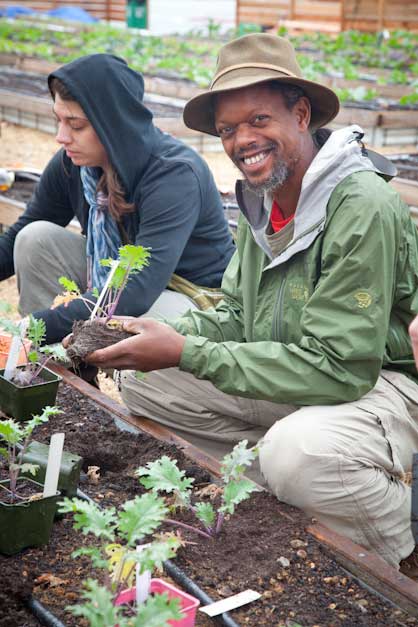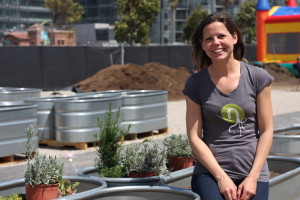Last year, City Slicker Farms grew and distributed almost 7,000 pounds of pay-what-you-can produce in West Oakland. That number may double in coming years, thanks to a $4 million grant the nonprofit won last week. Awarded through Proposition 84, a 2006 initiative that approved bonds for environmental projects throughout the state, the money will allow City Slicker Farms to purchase and develop 1.4 acres of land into a neighborhood farm and park.
The new project will both increase affordable fresh food in West Oakland and, says Executive Director Barbara Finnin, “help legitimize this kind of work in urban agriculture.”
City Slicker Farms has been doing “this kind of work” since 2001, when a group of West Oakland residents decided to address the neighborhood’s lack of healthy food outlets. They transformed a vacant lot, bought and donated by founder Willow Rosenthal, into an edible garden. Today, the non-profit operates six such plots, which have turned 220,000 square feet of underused space into fertile ground. City Slicker Farms also partners with individual households to install gardens in yards, a program that has equipped an estimated 350 people to grow their own food.
- Joseph (right) is one of City Slicker’s backyard garden mentors. Here, he and a volunteer are planting winter greens at the group’s Fitzgerald and Union Plaza Park. Photo courtesy City Slicker Farms.
“A lot of people see urban agriculture as being cute and small,” says Finnin. She hopes the grant will send the message that “we’re serious and we’ve always been serious.”
That message was abundantly clear to the people at California Department of Parks and Recreation who reviewed Proposition 84 grant applications. The department received nearly 500 project proposals vying for a share of “Nature Facilities Education Program” funds. Ultimately, it gave out 62 grants. The awards ranged in size from $400,000 to $5 million, placing City Slicker Farms at the higher end of the scale.
“That’s what they asked for and that’s what we gave them,” says Patti Keating, the department’s chief of grants and local services. “It’s a wonderful use of property and it’s exciting that an unused vacant lot would be transformed into an urban farm and community garden,” she explains.
Keating says the City Slicker Farms proposal stood out for its “level of involvement of people who live in the neighborhood,” a quality of utmost importance to the judges. All grant applicants were required to seek the input of residents near project sites, and Keating says the winning proposals “had a lot of community involvement.” City Slicker Farms visited neighborhood schools, organized community meetings, and conducted surveys to gather the opinions of hundreds of West Oakland residents. Keating hopes Proposition 84’s emphasis on community process is “a turning point for how future park proposals get developed. We want to make sure that parks are available and that the public makes use of them.”
Finnin aims to carry out this vision by creating a “space for people to hang out and meet and recreate and have fun.” The new project isn’t just about food: “It’s about community gathering spaces that people feel safe in,” she says. In addition to agricultural features like a vegetable patch, a fruit orchard, and a chicken coop, the new West Oakland Urban Farm and Park will also house lawn space, a children’s play area, and a dog park.
City Slicker Farms hasn’t announced a timeline for construction yet, although the grant allows eight years for project completion. “We’re not going to take that long,” says Finnin, “but it’s going to give us the time to do it right.” In the meantime, she hopes the project remains an “inspiration and a model” for organizations doing similar work.
To learn more about City Slicker Farms or the West Oakland Park and Urban Farm, visit www.cityslickerfarms.org.

.jpg)



-300x221.jpg)
-300x221.jpg)